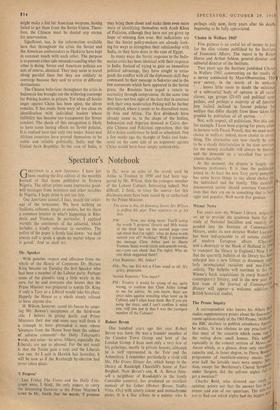`Choice in Welfare 1965' Five guineas is an awful lot
of money to pay for the slim volume published by the Institute of Economic Affairs. The report is by Ralph Harris and Arthur Seldon, general director and editorial director of the Institute.
Two years ago the Institute published Choice in Welfare 1963, commenting on the results of a survey conducted by Mass-Observation. This new survey, in the words of its authors,
. . leaves little room to doubt the existence of a substantial body of opinion in all social classes, age grOups (21-65) and political sym- pathies, and perhaps a majority of all families [my italics] inclined to favour policies for welfare that differ sharply from those taken for granted by politicians of all parties. . .
Not, with respect, all politicians. Not this one, for example. I have been arguing for years, often in harness with Enoch Powell, that we need more choice in welfare; indeed, more choice in c‘ thing. The alternative can now clearly be s to be a steady deterioration in the state serN for the money available will always be limit and the demands on a so-called free 'se: ice almost insatiable.
At the moment, the dispute* is largely between professois. It is time the politici joined in. At least the new Tory party pomp has some brave things to say about choice the individual and the family. This caret documented survey should convince Consei tives that they are on to something that is h right and popular. Well worth five guinea's.
oat filet for
oth






































 Previous page
Previous page